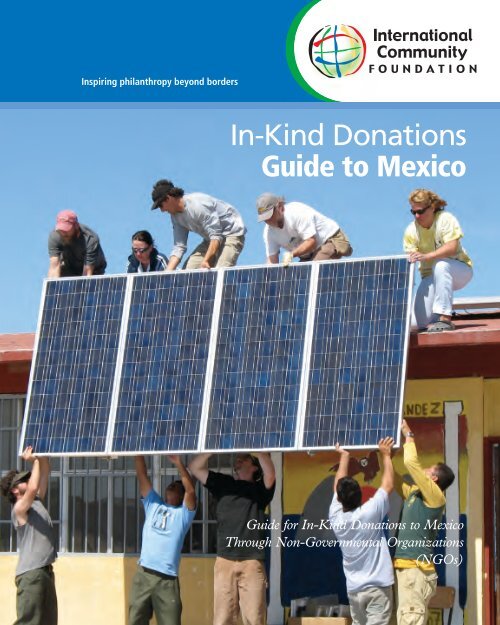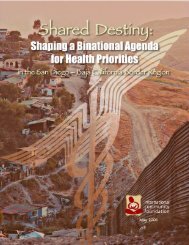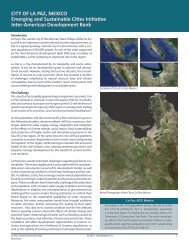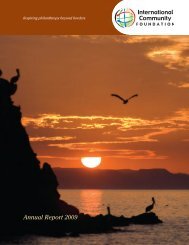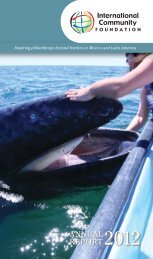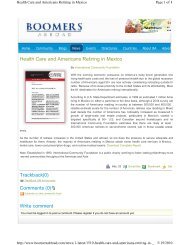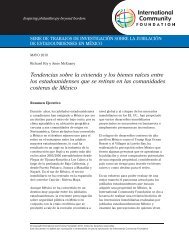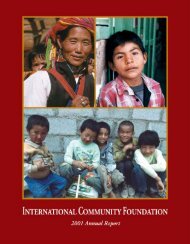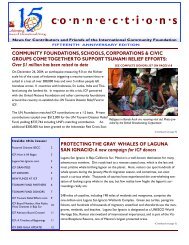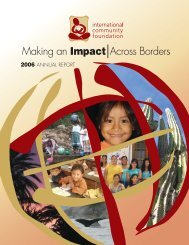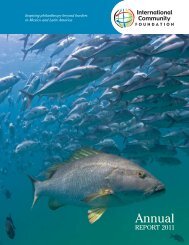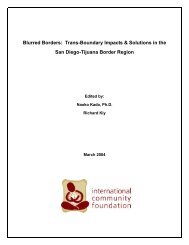In-Kind Donations to Mexico - International Community Foundation
In-Kind Donations to Mexico - International Community Foundation
In-Kind Donations to Mexico - International Community Foundation
You also want an ePaper? Increase the reach of your titles
YUMPU automatically turns print PDFs into web optimized ePapers that Google loves.
<strong>In</strong>-<strong>Kind</strong> <strong>Donations</strong><br />
Guide <strong>to</strong> <strong>Mexico</strong><br />
Guide for <strong>In</strong>-<strong>Kind</strong> <strong>Donations</strong> <strong>to</strong> <strong>Mexico</strong><br />
Through Non-Governmental Organizations<br />
(NGOs)
<strong>In</strong>-<strong>Kind</strong> <strong>Donations</strong><br />
Guide <strong>to</strong> <strong>Mexico</strong><br />
Table of Contents<br />
<strong>In</strong>troduction . . . . . . . . . . . . . . . . . . . . . . . . . . . . . . . . . . . . . . . . . . . . . . . 3<br />
Letter from Federal Congressman Carlos Torres Torres . . . . . . . . . . . . 4<br />
Permitted <strong>In</strong>-<strong>Kind</strong> <strong>Donations</strong> . . . . . . . . . . . . . . . . . . . . . . . . . . . . . . . . . 5<br />
Not Permitted <strong>In</strong>-<strong>Kind</strong> <strong>Donations</strong> . . . . . . . . . . . . . . . . . . . . . . . . . . . . . 5<br />
Steps for Making <strong>In</strong>-<strong>Kind</strong> <strong>Donations</strong> . . . . . . . . . . . . . . . . . . . . . . . . . . . 6<br />
<strong>In</strong>ternational<br />
<strong>Community</strong><br />
FOUNDATION<br />
<strong>In</strong>spiring philanthropy beyond borders<br />
Cover S<strong>to</strong>ry: <strong>In</strong> March 2008 <strong>In</strong>spiring solar philanthropy panels, beyond ecological borders <strong>to</strong>ilets, and wind genera<strong>to</strong>rs were<br />
donated <strong>to</strong> two public schools in Laguna San Ignacio, BCS, <strong>Mexico</strong>. The in-kind donation<br />
was significant because the community in Laguna San Ignacio is remote and geographically<br />
isolated, located off the electrical grid and without clean water access or sewage hook ups.<br />
<strong>In</strong>spiring philanthropy beyond borders<br />
Tony Moats, a resident of Boulder, Colorado contacted the <strong>In</strong>ternational <strong>Community</strong><br />
<strong>Foundation</strong> <strong>to</strong> help with the <strong>In</strong>spiring in-kind philanthropy importation beyond borders of the energy generation hardware and<br />
<strong>to</strong>ilets. The <strong>In</strong>ternational <strong>Community</strong> <strong>Foundation</strong> partnered with Tijuana based Fundación<br />
para la Protección de la Niñez (www.infanciamexico.org) <strong>to</strong> carry out the duty free<br />
importation through the Tijuana port of entry. <strong>In</strong> addition <strong>to</strong> the equipment donation,<br />
funding was provided by the Natural Resources Defense Council (NRDC) and<br />
Philanthropiece, <strong>In</strong>c. <strong>to</strong> provide computers <strong>to</strong> convert a classroom in<strong>to</strong> a computer<br />
lab, and <strong>to</strong> make overall school improvements.
<strong>In</strong>-<strong>Kind</strong> <strong>Donations</strong><br />
Guide <strong>to</strong> <strong>Mexico</strong><br />
<strong>In</strong>troduction<br />
For years, people have been making in-kind<br />
donations of goods <strong>to</strong> <strong>Mexico</strong>. Unfortunately, a<br />
lack of understanding of the legal process has led<br />
<strong>to</strong> problems getting the donations <strong>to</strong> the appropriate<br />
recipients. Recognizing the lack of understanding that<br />
most donors have about in-kind donations, this Guide<br />
has been developed <strong>to</strong> help those who want <strong>to</strong> give<br />
items <strong>to</strong> <strong>Mexico</strong> while also being in compliance with<br />
Mexican law. The Mexican tax authority, the Servicio de<br />
Administración Tributaria, or SAT, has established a<br />
relatively simple process for giving goods <strong>to</strong> <strong>Mexico</strong><br />
through in-kind donations <strong>to</strong> a specific class of Mexican<br />
non-governmental organizations (NGOs) known as<br />
Authorized Donees (“Donatarias Au<strong>to</strong>rizadas”). 1<br />
The <strong>In</strong>ternational <strong>Community</strong> <strong>Foundation</strong>, Fundación<br />
<strong>In</strong>ternacional de la Comunidad, and Mexican<br />
Congressman Carlos Torres Torres from Tijuana have<br />
written this Guide <strong>to</strong> help U.S. donors better<br />
understand this process.<br />
To facilitate in-kind donations, the SAT has streamlined<br />
its authorization process by introducing an online form<br />
- the electronic form (“firma electrónica”). The “firma<br />
electrónica” allows for faster processing of a donees<br />
This Guide concerns in-kind gifts meeting<br />
the following conditions: 2<br />
• Donated goods or commodities are<br />
in good condition and are valued in<br />
excess of US$300; and<br />
• <strong>Donations</strong> are made <strong>to</strong> registered<br />
Authorized Donees;<br />
By following these rules, donors may<br />
avoid paying duties on the donated<br />
goods in <strong>Mexico</strong> and may also seek tax<br />
deductions for the donation in the U.S.<br />
intro<br />
request <strong>to</strong> receive in-kind donations. Although this<br />
improvement has made the process faster, there are<br />
other fac<strong>to</strong>rs besides time that should be considered. It<br />
must be pointed out that in-kind donations are not<br />
without costs <strong>to</strong> both the donor and recipient.<br />
Applicable expenses may include transportation <strong>to</strong> the<br />
U.S./<strong>Mexico</strong> border, warehouse/s<strong>to</strong>rage facility costs;<br />
staff time in the U.S. and <strong>Mexico</strong> <strong>to</strong> process the<br />
paperwork; and transportation within <strong>Mexico</strong>.<br />
Authorized Donee beneficiaries may be able <strong>to</strong> absorb<br />
some of these expenses, but donors should be aware<br />
of the potential hardship that may be placed on the<br />
organizations receiving the donations. For this reason,<br />
in-kind donations that are accompanied with a cash<br />
grant often make the most sense <strong>to</strong> ensure that the<br />
donation will arrive at its intended location and be<br />
used for the intended purpose.<br />
It is encouraged that donors and recipients follow the<br />
rules and regulations for making in-kind donations <strong>to</strong><br />
Authorized Donees in <strong>Mexico</strong>. While many<br />
individuals/donors may have the best intentions <strong>to</strong><br />
donate items <strong>to</strong> <strong>Mexico</strong>, the consequences for bringing<br />
illegal items across the border can be severe. For<br />
example, if an individual gets caught illegally bringing<br />
used clothes in<strong>to</strong> <strong>Mexico</strong>, the clothes may be<br />
confiscated, the car could be impounded, or worse,<br />
one could face criminal charges. The hope is that this<br />
Guide serves as a useful reference that helps support<br />
in-kind donations and encourages goodwill between<br />
the U.S. and <strong>Mexico</strong>.<br />
1 Mexican Authorized Donees may have juridical personality under<br />
different legal forms. The principal legal forms are “Asociación Civil,”<br />
(A.C.), “<strong>In</strong>stitución de Asistencia Privada” (I.A.P.); and “<strong>In</strong>stitución de<br />
Beneficiencia Privada.” Organizations with Authorized Donee status have<br />
the right <strong>to</strong> issue receipts <strong>to</strong> donors in order for the donors <strong>to</strong> receive tax<br />
deductions from Mexican income tax. These receipts may also support<br />
deductions from U.S. income tax under an applicable U.S.-<strong>Mexico</strong> treaty. <strong>In</strong><br />
exchange for this preferential status, Authorized Donees follow strict<br />
reporting requirements regarding their receipt and use of donations.<br />
2 The process described in this Guide is not designed <strong>to</strong> instruct<br />
those interested in the casual donation of <strong>to</strong>ys or clothing.<br />
3
“As much societal involvement as possible<br />
and only government when it is necesary. ”<br />
Due <strong>to</strong> globalization and international trade, the impact on society of non-governmental organizations<br />
(NGOs) has become a more influential fac<strong>to</strong>r related <strong>to</strong> many world issues. NGOs are consulted daily by their<br />
governments around the world. I am convinced in the power of voluntary work within a social structure and I<br />
recognize that any NGO that acts independently from any government usually depends on outside donations<br />
and volunteer services <strong>to</strong> attend <strong>to</strong> large societal problems.<br />
<strong>In</strong> my personal experience and as a congressman in <strong>Mexico</strong> I have realized that in the words of Vic<strong>to</strong>r Hugo<br />
“democracy is not enough; it is also essential <strong>to</strong> be humane.” I have learned <strong>to</strong> appreciate this with the<br />
individuals that represent non-governmental organizations who with their intelligence and virtue struggle daily<br />
against the obstacles that limit access <strong>to</strong> resources needed <strong>to</strong> provide better services for their communities. I<br />
am convinced that our role as legisla<strong>to</strong>rs and government officials is <strong>to</strong> promote the following:<br />
a) Government should respect the au<strong>to</strong>nomy of non-governmental organizations<br />
b) Recognize the social significance of NGO activities<br />
c) Treat NGOs as public interest institutions<br />
d) Offer incentives and stimuli, both fiscal and legal, that is <strong>to</strong> say, as prerogatives of the<br />
NGO community not subject <strong>to</strong> the decisions of governmental entities<br />
e) A transparent system for the use of public funds that are designated <strong>to</strong> strengthen civil society.<br />
This is why I under<strong>to</strong>ok the task of simplifying one of the processes that has been impeding NGOs (that are<br />
Donatarias Au<strong>to</strong>rizadas) <strong>to</strong> accept donations from abroad. It has been a long struggle for the noble efforts of<br />
the NGOs, their testimony and perseverance in spite of the adversity.<br />
I want <strong>to</strong> extend my appreciation and gratitude <strong>to</strong> the Servicio de Administración Tributaria de México (SAT)<br />
for their support in order <strong>to</strong> simplify the procedure for importing donations from abroad by au<strong>to</strong>mating the<br />
process via the <strong>In</strong>ternet through firma electrónica. <strong>In</strong> the past, this procedure sometimes <strong>to</strong>ok up <strong>to</strong> a year and<br />
can now be completed in a few weeks. I recognize that this new system only benefits Mexican NGOs that are<br />
Donatarias Au<strong>to</strong>rizadas, but I believe this is the first step in promoting more efficiency.<br />
I am grateful <strong>to</strong> the NGOs that have given me the opportunity <strong>to</strong> learn about their work, and as the old<br />
Native American saying tells us, “Unless you have walked in the moccasins of another man, you do not know<br />
this man, you have no idea how he thinks and feels and you no have idea why he does certain things.” I want<br />
<strong>to</strong> tell you that is how I was able <strong>to</strong> accomplish this task, by putting myself in the shoes of an NGO.<br />
I am committed <strong>to</strong> continue my search for options because I am convinced that <strong>Mexico</strong> has a great legacy of<br />
effort, sacrifice, and selflessness, of joint achievements in the past, and in the present and a common mission.<br />
I want <strong>to</strong> reiterate my commitment <strong>to</strong> work <strong>to</strong>ward a future with a common vision.<br />
Very truly yours:<br />
Lic. Carlos Alber<strong>to</strong> Torres Torres<br />
DIPUTADO FEDERAL<br />
Lic. Carlos Alber<strong>to</strong> Torres Torres<br />
DIPUTADO FEDERAL POR BAJA CALIFORNIA<br />
XIX LEGISLATURA<br />
CAMARA DE DIPUTADOS<br />
4
FOUNDATION<br />
<strong>In</strong>-<strong>Kind</strong> <strong>Donations</strong><br />
Guide <strong>to</strong> <strong>Mexico</strong><br />
LIST OF PERMITTED IN-KIND<br />
DONATIONS TO MEXICO<br />
1. Ambulances and mobile clinics that offer<br />
medical services or have radiology<br />
equipment<br />
2. Buses/vans for the use of educational<br />
institutions (schools)<br />
13. Reconstructed/refurbished eye-glasses or frames<br />
14. Bottled water and canned food<br />
15. Books<br />
16. Fire extinguishers and oxygen tanks<br />
17. Musical instruments<br />
18. Sports equipment<br />
19. Products for personal hygiene and home<br />
cleaning products<br />
20. School and office equipment<br />
<strong>In</strong>ternational<br />
<strong>Community</strong><br />
FOUNDATION<br />
21. Toys not coming from China<br />
22. New clothes and new shoes not coming<br />
from China<br />
ITEMS NOT PERMITTED FOR IN-KIND<br />
DONATIONS TO MEXICO*<br />
School bus donated <strong>to</strong> Project Amigo in Colima, <strong>Mexico</strong> 1. Items that are already in <strong>Mexico</strong><br />
2. Donated items where the donor and the<br />
3. Fire engines<br />
recipient are the same person<br />
4. Garbage trucks equipped with a compac<strong>to</strong>r,<br />
sweeping cars, and tankers<br />
3. Items donated by Mexican nationals that<br />
domiciled in <strong>Mexico</strong><br />
5. Tow trucks, buses for dredging and Trucks with<br />
hydraulic equipment<br />
4. Items subject <strong>to</strong> countervailing duties<br />
(Cus<strong>to</strong>ms agent can inform you)<br />
6. New or used computing equipment as well as its<br />
peripherals for educational institutions<br />
5. Used clothing<br />
(schools)<br />
6. Used shoes<br />
7. Medical equipment and labora<strong>to</strong>ry instruments 7. New shoes from Asian countries<br />
8. Wheelchairs<br />
8. Canned food that is expired<br />
9. Orthopedic equipment<br />
9. Bottled water that will expire within<br />
10. Medical products such as: bandages, needles<br />
for injections, forceps<br />
11. Medicines and/or vitamins<br />
12. Diverse prostheses and rehabilitation prostheses<br />
three months<br />
10. Medicine that will expire within one year<br />
*This is not an exhaustive list and items can<br />
change according <strong>to</strong> Cus<strong>to</strong>ms rules and regulations.<br />
For more details visit:<br />
<strong>In</strong>ternational<br />
<strong>Community</strong><br />
www.sat.gob.mx/sitio_internet/servicios/promociones_agj/34_5844.html<br />
5
FOUNDATION<br />
FOUNDATION<br />
FOUNDATION<br />
Steps for Making<br />
<strong>In</strong>-<strong>Kind</strong> <strong>Donations</strong> <strong>to</strong> <strong>Mexico</strong><br />
This process is specifically for formal in-kind donations <strong>to</strong> be received by NGOs in <strong>Mexico</strong> that are registered as<br />
<strong>In</strong>ternational<br />
<strong>Community</strong><br />
Donatarias Au<strong>to</strong>rizadas. For a list of Donataria Au<strong>to</strong>rizadas in <strong>Mexico</strong> see:<br />
www.sat.gob.mx/sitio_internet/servicios/donatarias/au<strong>to</strong>rizadas/default.asp<br />
1. 1 Procedure for U.S. Donors:<br />
a. The donor must communicate with the Mexican<br />
NGO and send a detailed letter in Spanish<br />
(carta del donante) <strong>to</strong> the Mexican Donataria<br />
Au<strong>to</strong>rizada describing the donation. The<br />
description should specify:<br />
• The legal name of the Mexican Donataria<br />
Au<strong>to</strong>rizada<br />
• Quantity and unit measurement<br />
• Description, brand, and model<br />
• Material composition<br />
• Country of origin<br />
• Value of the item<br />
• Port of entry for the importation<br />
• Additional information such as, catalogues,<br />
manuals, pho<strong>to</strong>s, receipts or invoices can be<br />
uploaded <strong>to</strong> the Servicio de Administración<br />
Tributaria de México (SAT) website:<br />
<strong>In</strong>ternational<br />
<strong>Community</strong><br />
www.sat.gob.mx/sitio_<br />
internet/servicios/promociones<br />
_agj/34_5844.html<br />
b. Donors should receive confirmation within a<br />
month along with appropriate documentation<br />
from the Mexican NGO once the in-kind<br />
donation has been approved. The documents<br />
need <strong>to</strong> be shown at the Port of Entry.<br />
intro<br />
. 2 Procedure for Recipient NGO in <strong>Mexico</strong> for Electronic Submission:<br />
a. The recipient NGO that must also be a<br />
registered Donataria Au<strong>to</strong>rizada can use firma<br />
electrónica (electronic signature) or the regular<br />
(paper) process <strong>to</strong> request permission <strong>to</strong> import<br />
donated items.<br />
b. For firma electrónica (Firma Electrónica Avanzada<br />
(FIEL) visit:<br />
<strong>In</strong>ternational<br />
<strong>Community</strong><br />
www.sat.gob.mx/sitio_internet/e_<br />
sat/tu_ firma/<br />
c. Submit the letter from the donor (carta del<br />
donante) translated in<strong>to</strong> Spanish indicating<br />
the donated items.<br />
The Mexican Donataria<br />
Au<strong>to</strong>rizada must:<br />
1<br />
2<br />
Possess a Clave de Identificación<br />
Electrónica Confidencial (CIEC)<br />
Be enrolled in Firma<br />
Electrónica Avanzada (FIEL)<br />
3<br />
Have applied through Forma<br />
Oficial <strong>to</strong> be part of Sistema<br />
Au<strong>to</strong>matizado de Donaciones<br />
del Extranjero<br />
6<br />
p. 6
➺<br />
FOUNDATION<br />
Steps for Making<br />
<strong>In</strong>-<strong>Kind</strong> <strong>Donations</strong> <strong>to</strong> <strong>Mexico</strong><br />
d. Submit a document that verifies who the legal<br />
representative (Acreditación del Represente Legal)<br />
is for the Donataria Au<strong>to</strong>rizada.<br />
intro<br />
e. <strong>In</strong> the case of a vehicle donation, one must also<br />
attach the title of ownership and pictures of the<br />
vehicle.<br />
f. Only items that comply with rules and regulations<br />
for non tariff barriers as well as official rules or<br />
guidelines for Mexican government agencies<br />
including: Secretaría de Economía; Secretaría de<br />
Agricultura, Ganadería; Desarrollo Rural, Pesca y<br />
Alimentación; Secretaría de Salud; y Secretaría de<br />
Medio Ambiente y Recursos Naturales can be<br />
donated duty free.<br />
g. Authorization from SAT will be sent electronically<br />
<strong>to</strong> the Donataria Au<strong>to</strong>rizada within as a month.<br />
h. Once the Donataria Au<strong>to</strong>rizada receives the<br />
authorization from SAT the item can be imported<br />
at the Port of Entry. The authorization is valid<br />
through the end of the calendar year.<br />
i. Transport and deliver only the exact items that<br />
were approved by SAT for the importation.<br />
j. No Cus<strong>to</strong>ms agent is necessary.<br />
p. 7<br />
More Details Online<br />
For detailed instructions for in-kind<br />
donations from the Mexican<br />
government agency<br />
Servicio de Administración<br />
Tributaria (SAT) visit:<br />
www.sat.gob.mx/sitio_internet/ho<br />
me.asp<br />
➺ “Otros Servicios”<br />
➺ “Promociones Jurídicas”<br />
click on<br />
“Manual Práctico para las<br />
Donaciones del Extranjero<br />
– Artículo 61 Fracción XVII de la<br />
Ley Aduanera”<br />
For English follow the steps above<br />
and click on<br />
➺ “Versión en <strong>In</strong>glés” Appendix<br />
3<br />
Procedure for Recipient NGO in <strong>Mexico</strong> for Paper Submission:<br />
FOR THE PAPER PROCESS,<br />
THE FORM CAN BE<br />
<strong>In</strong>ternational<br />
<strong>Community</strong><br />
DOWNLOADED AT:<br />
www.sat.gob.mx/sitio_internet/<br />
servicios/promociones_agj/34_<br />
6721.html<br />
p. 6<br />
Please note that procedures are subject <strong>to</strong> change or may be updated.<br />
Review the SAT websites for new laws, regulations, and procedures.<br />
7
<strong>In</strong>ternational<br />
<strong>Community</strong><br />
FOUNDATION<br />
2505 N AVENUE<br />
NATIONAL CITY, CA 91950<br />
(619) 336-2250<br />
<strong>In</strong>spiring philanthropy beyond borders<br />
www.icfdn.org<br />
<strong>In</strong>spiring philanthropy beyond borders<br />
BLVD. FUNDADORES | #2480 | COL. JUAREZ<br />
TIJUANA, BC | MEXICO 22040<br />
(664) 200-2727<br />
www.ficbaja.org<br />
Acknowledgements:<br />
<strong>In</strong>spiring philanthropy beyond borders<br />
This report would not have been possible without the ongoing support and dedication of the following people:<br />
Fundacion <strong>In</strong>ternacional <strong>In</strong>spiring philanthropy de la Comunidad beyond borders (Ma. An<strong>to</strong>nieta Beguerisse); <strong>In</strong>ternational <strong>Community</strong> <strong>Foundation</strong> (Amy<br />
Carstensen and Richard Kiy) The Office of Congressman Carlos Torres Torres (Edith Pérez Velázquez and<br />
Congressman Carlos Torres Torres.)<br />
The <strong>In</strong>ternational <strong>Community</strong> <strong>Foundation</strong> wishes <strong>to</strong> thank the following individuals for peer reviewing this<br />
document: Consuelo Castro, Erick Alber<strong>to</strong> Ahuja Chavez, Mary Correia-Moreno, Josefina Durán, Ma. Aurora Garza<br />
Hernández , Susan Hill, Michelle Jaramillo, Michael Lay<strong>to</strong>n, Anilú Mendoza, Jocelyn Nieva, Walter Parks, Ted Rose,<br />
Monica San<strong>to</strong>s, and Angela Scott.<br />
Pho<strong>to</strong> Credits:<br />
Carlos Graizbord, Tony Moats, Anne McEnany, Project Amigo, and Deidre Schoo<br />
Translated by:<br />
Designed by:<br />
Lic. Mariona López Chalamanch<br />
Amy Ezquerro / Aim Design<br />
Donation Success S<strong>to</strong>ry: <strong>In</strong> the summer of 2004 San Diego’s Old Globe<br />
Theater made plans <strong>to</strong> renovate their 500 seat theatre. Through the <strong>In</strong>ternational<br />
<strong>Community</strong> <strong>Foundation</strong>, the Old Globe learned that the Teatro Juarez in La Paz,<br />
<strong>Mexico</strong> needed seats. Responding <strong>to</strong> this need, the Old Globe generously donated<br />
the seats for the benefit of this his<strong>to</strong>ric 275 seat capacity Mexican theater with the<br />
remaining seats used for spare parts and <strong>to</strong> retrofit a smaller community based<br />
theatre in the community of Todo San<strong>to</strong>s. Beyond the physical donation,<br />
additional funding was needed <strong>to</strong> cover the cost of transportation, temporary<br />
warehousing, and cus<strong>to</strong>ms fees which the <strong>In</strong>ternational <strong>Community</strong> <strong>Foundation</strong><br />
secured from local San Diego area donors. Thanks <strong>to</strong> this unique in-kind gift, La<br />
Paz and Todo San<strong>to</strong>s now have remodeled theatres and closer cross-cultural ties<br />
have been forged with the arts community in San Diego.


